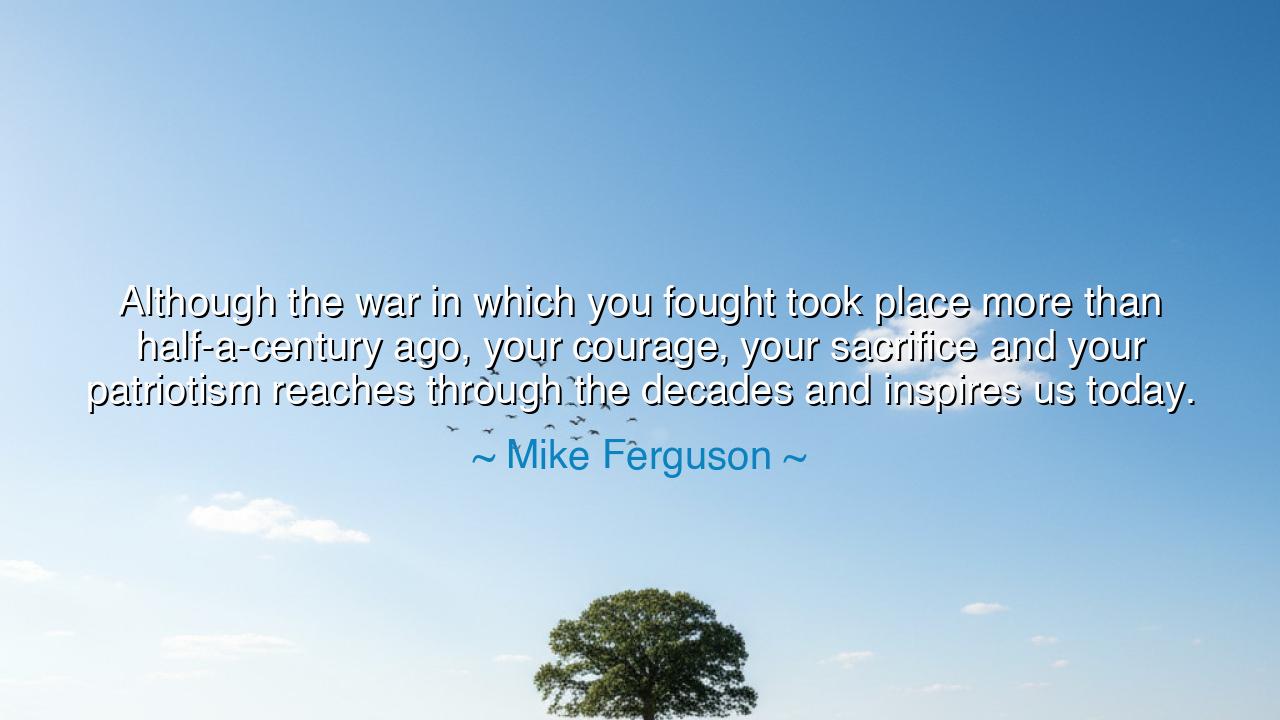
Although the war in which you fought took place more than
Although the war in which you fought took place more than half-a-century ago, your courage, your sacrifice and your patriotism reaches through the decades and inspires us today.






“Although the war in which you fought took place more than half-a-century ago, your courage, your sacrifice and your patriotism reaches through the decades and inspires us today.” Thus spoke Mike Ferguson, an American statesman whose words ring like a trumpet call of remembrance. In this declaration, he speaks not only to soldiers long gone, but to all who have ever given of themselves for a cause greater than their own. His voice bridges time — reminding us that courage, sacrifice, and patriotism are not bound by years, but are eternal lights in the human spirit. Though the battles of the past may have faded into history, the virtue of those who fought them still burns, guiding future generations toward honor and unity.
The origin of this quote lies in the context of remembrance — spoken during a commemoration for veterans of wars past, likely those of the Second World War. When Mike Ferguson offered these words, he was not merely giving praise to men of arms; he was reaffirming the sacred duty of memory. For the deeds of the brave must not be allowed to vanish with the turning of the seasons. The warriors of long ago — those who stormed the beaches of Normandy, who stood in the snows of Korea, who bled on foreign soil for the sake of freedom — deserve more than monuments of stone. They deserve remembrance that breathes, that speaks, that inspires. Ferguson’s words are such a remembrance — a bridge between past valor and present gratitude.
When he speaks of “courage reaching through the decades,” he captures a truth that transcends war itself: that bravery does not perish with the body. The courage of one generation strengthens the hearts of those that follow. The soldier who stood firm under fire becomes a symbol, not of violence, but of steadfastness. His story whispers to the youth who doubt their own strength: You too can endure. You too can stand when the world trembles. Thus, courage is a kind of inheritance — not in blood or gold, but in example. It passes silently, unseen, yet it shapes the character of nations.
Consider the story of the soldiers at Iwo Jima — young men who, in the spring of 1945, faced impossible odds upon a barren volcanic island. For thirty-six days, they fought against fire and fury, not for conquest, but for duty. Many of them would never see home again. Yet their struggle — captured in the raising of the American flag atop Mount Suribachi — became a symbol of the enduring spirit of human bravery. Decades have passed, and yet the image remains, etched into the soul of a people. This is what Ferguson meant: that sacrifice and patriotism reach through time, stirring the hearts of those who come after, calling them to courage in their own battles — whether on fields of war or in the challenges of peace.
The sacrifice Ferguson speaks of is not merely the giving of one’s life, but the surrender of comfort, of safety, of self. The soldier sacrifices years of youth, the family man sacrifices presence at the hearth, the mother at home sacrifices peace of mind. These offerings are not measured by their immediacy, but by their endurance. For generations later, when children live in freedom and peace, they do so because others bore the weight of struggle. To remember this is to honor not only the fallen, but the living legacy of all who served. Their patriotism, as Ferguson describes it, is not blind allegiance to a flag, but a conscious devotion to the ideals that the flag represents — liberty, justice, and the dignity of all humankind.
And yet, Ferguson’s words also carry a quiet warning. To allow such courage to fade into mere ceremony is to lose the moral fire it was meant to kindle. Every generation must decide whether it will be worthy of the sacrifices made before it. The inspiration of the past must be transformed into the action of the present — into kindness, civic duty, courage in daily life. We honor the fallen not only by saluting their memory, but by embodying their spirit. To live honorably, to serve others, to protect what is right — these are the modern forms of the same valor Ferguson praised.
So, dear listener, let this wisdom settle upon your heart: the courage of the past is a torch handed to you. You did not earn it, but you must carry it. Whether you face hardship, injustice, or doubt, remember those who came before — who stood unflinching when the world itself seemed to crumble. Their faith, their endurance, their patriotism, live on in you. Do not let their light dim. Let it shine through your actions, your words, your compassion. For every time you act with integrity, you honor them anew.
As Mike Ferguson reminds us, time may erode the battlefields, but not the bravery that once sanctified them. The echoes of courage, sacrifice, and patriotism do not belong to history alone — they belong to eternity. And so long as men and women remember, so long as they live with gratitude and purpose, the heroes of old will never truly die. They will walk beside us still — unseen, but ever-present — whispering to every generation: Be worthy of what was won for you.






AAdministratorAdministrator
Welcome, honored guests. Please leave a comment, we will respond soon